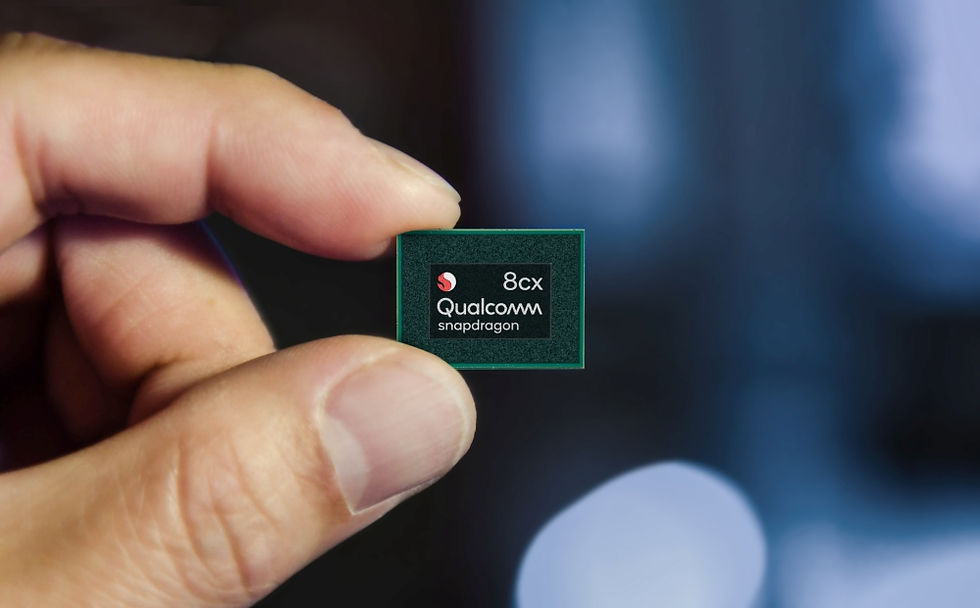Apple May Have Opened A Bigger Market For Qualcomm
- Ronit Roy
- Jul 11, 2020
- 3 min read
Updated: Sep 8, 2020
During WWDC20 Apple announced that they'll be transitioning their Macs from Intel to their own Apple Silicon. Apple requires about two years to transition all their current Intel based Macs to their own custom ARM based SOCs but, they'll release the first device of this new product line, around the end of 2020. However, if we look away from that for a moment, a bigger conversation exists about ARM based computers in general.
Before Apple even spoke of switching to ARM, Qualcomm has been making ARM based SOCs for portable PCs for several years now. Some manufacturers have adapted these chips & released a number of Snapdragon powered PCs. Although these devices sustain battery way better, allow cellular connectivity options and allow devices to be thinner, most people weren't really really buying Snapdragon powered PCs. This is not because the technology was inferior but, mostly because the apps weren't properly optimized to run on an ARM based computer that was running Windows 10.

Take the Surface Pro X for example. Microsoft teamed up with Qualcomm to develop the custom SQ1 chip which is an ARM based SOC and from a raw hardware perspective, is pretty capable. But, it's really hard to get real work done on that device. Clearly the SOC wasn't the problem. Because the majority of the PCs were still running Intel & AMD CPUs and the potential growth of ARM based PCs were still a question mark, developers never really invested the time to properly optimize their Apps to run on ARM chips. This became the biggest bottleneck for the SQ1 and all the other consumer PC chips Qualcomm was making. When your computer lacks the desired performance & doesn't really come cheap either, it's hard to care for stuff like longer Battery Life & Gigabit LTE.
How Apple Silicon Can Expand The Market For Qualcomm
However, this situation may change with Apple's transition to ARM based SOCs. When Apple start transitioning to ARM they'll be replacing all their current gen Intel based Mac products with Apple Silicon based ones. That means in the future, if you want to use MacOS, you have to a buy an Apple Silicon based computer. This is something developers have to get on with. If they don't they're gonna be cut out right? We already saw Adobe & Microsoft having their apps ready on the announcement day and others will be doing the same once the Apple Silicon based computers start hitting the market.

This changes the situation for Qualcomm. As ARM based Apple Silicon Macs become mainstream, developers will have more reasons to invest their resources into optimizing their apps for the same. This also changes how developers look at ARM based PC chips in general. Instead of being something totally outside public interest, these chips are now becoming the new hotcake of the market. Everyone wants a piece of that. So now, when new ARM based Windows computers are released, a lot more people will be interested in them and developers will finally have a reason to invest their time & resources to optimize their apps for the same.
This is definitely bad news for Intel & AMD. As mentioned previously, ARM has a substantial advantage when it comes to Battery Life & it supports cellular technologies which means we'll be seeing a lot of 5G computers with a few Snapdragon 8cx 5G powered ones being available right now. Cooling these chips is also way easier compared to Intel & AMDs x86 chips and they often don't require fans which allow ARM devices to be super thin. As we've seen in the iPad Pro & current gen smartphones, these chips are also super powerful with the A12Z inside the iPad Pro knocking some Intel powered ultrabooks and Apple's own Macbook Air 2020, out of the water. If apps are optimized properly, it eliminates the performance bottleneck and gives manufacturers a reason to include more ARM based PCs in their next product line. Right now Qualcomm already have a dedicated series of ARM chips for PCs and although this change comes from Apple, it may have opened a bigger market for Qualcomm.
Comments